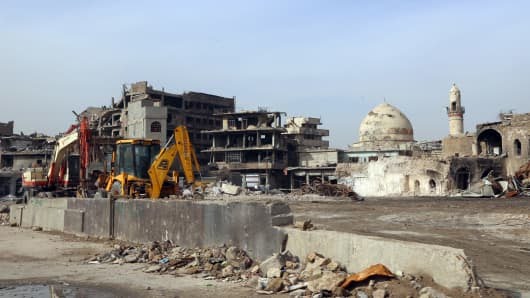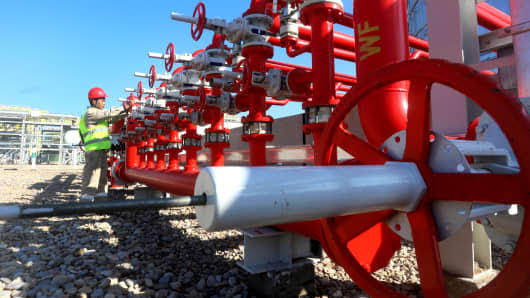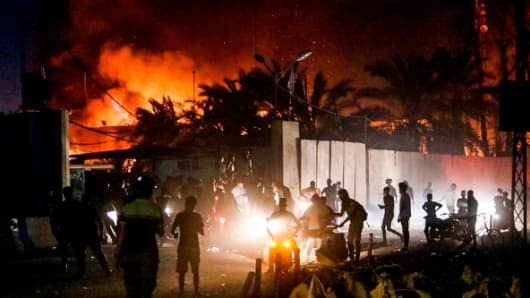Farm
VIP
Baghdad signed into law one of its largest-ever spending packages last week after months of gridlock. At $111.8 billion, the 2019 budget is a nearly 45 percent increase on the previous year's, featuring the highest deficit and second-highest spending volume in Iraq's history since the fall of Saddam Hussein in 2003.
But despite desperate need for reconstruction funding after its devastating three-year war with the Islamic State, and with a crippled business sector beset by government corruption, Iraqi experts say the spending plan still fails to address the country's most urgent problems.
"The amount of waste and wrongly allocated money is outrageous," Abbas Kadhim, director of the Atlantic Council's Iraq Initiative, told CNBC on Tuesday. "Despite being a very large spending plan, Iraq's new budget still suffers from the same problems. Too much of the budget goes to salaries… In the meantime, necessary spending on new infrastructure and reconstruction is not adequate."
Nearly half of the budget — $52 billion — will go to public sector salaries, pensions, and social security for government employees, a 15 percent spike from 2018. $27.8 billion will go to investments, with the deficit set to more than double to $23.1 billion, as reported by AFP.
Parliament members from the predominantly Sunni areas devastated by the anti-Islamic State (IS) campaign accuse the Shia-dominated government of not allocating sufficient funds to their areas' reconstruction. The International Monetary Fund (IMF) has calculated Iraq would need more than $88 billion to rebuild those areas, but international commitments have yet to meet even half of that goal.

Hemn Baban | Anadolu Agency | Getty Images
Reconstruction works continue in Mosul, Iraq after 9 months long anti Daesh operations on January 25, 2018.
And to Kadhim's point, the money allocated to public sector salaries is dramatically higher than in previous years, with significant windfalls for the Kurdistan Regional Government (KRG) and the Peshmerga, the KRG's military force, a move thought to be aimed at easing tensions between the autonomous region and Baghdad. But critics of the budget package called it a bid for short-term popular gains that avoids more painful, yet necessary, reforms.
'Just short-term wins'
"A quick glance at the 2019 federal budget and you can tell this government is not here to make unpopular decisions like continuing economic reforms undertaken by the previous government during low oil prices," Hamzeh Hadad, an Iraqi writer and analyst, wrote on Twitter. "No long-term economic vision, just short-term wins with the public."
Oil revenues make up nearly 90 percent of Iraq's budget. This year's is based on a projection of oil exports at 3.88 million barrels per day (bpd), up from 3.8 million in 2018, and at $56 per barrel, compared to the $46 a barrel price that last year's budget was based on.
For Kadhim, hinging the budget on oil production and prices is irresponsible. "Neither variable is totally in the hands of the Iraqi government, as the former can be interrupted by any number of problems and the latter can sink significantly below the $56/barrel on which the budget is based," he said.

Essam al-Sudani | Reuters
A worker is seen at the new CPF3 oil station in the Halfaya oilfield in southern of Maysan province, Halfaya, Iraq December 12, 2018.
International benchmark Brent Crude is currently hovering around $60 per barrel, with forecasts for 2019 mixed -- the IMF predicts Brent's price at just under $60 a barrel for the coming year, while a number of banks see it in the range between $65 and $70. Iraq has been enjoying record levels of crude production in the last year, pumping upwards of 4.6 million bpd in the second half of 2018, according to OPEC.
A lack of bold reforms
But the budget is also a reflection of the political pressures and competing priorities in Iraq's fragmented government, whose Prime Minister, Adel Abdel Mahdi, lacks a firm base of support and whose cabinet remains incomplete more than 8 months after national elections. Neither the prime minister's office nor the Iraqi Embassy in London were available for a comment at time of publication.
"The result is far from perfect," said Omar al-Nidawi, a country analyst and Iraq director at advisory firm Gryphon Partners, who noted the dearth of resources facing Baghdad. "It's a budget that's big in its spending, big in its deficit, but small in its investment allocations. It also does not promise much in the way of the bold economic reforms Iraq needs. Operational spending (read: salaries) will eat up the largest part, about 75 percent compared to under 25 percent for investment."
Some of those bold reforms include greater support for private enterprise and non-oil sectors to diversify revenue sources and reduce dependence on the private sector, more efficient and transparent business procedures to facilitate investment, and perhaps most importantly, dedicated efforts to combat and punish endemic state corruption. Transparency International ranks Iraq 168 out of 180 countries on its 2018 Corruption Perception Index, while the World Bank's "Ease of Doing Business" ranking places Iraq at 171 out of 190 economies.
An urgent need to diversify
On the other hand, the budget selected a few areas where spending can be particularly effective at enabling economic growth down the road, al-Nidawi said, pointing to "significant allocations for the electricity sector and the allocation of about $340 million for a major port project in Basra."
The southern Iraqi city of Basra, mired in poverty and lacking basic public services including reliable electricity and clean water, erupted in violent protests last summer that saw attacks on number of government buildings and foreign consulates, including those of the U.S. and Iran.

Haidar MOHAMMED ALI | AFP | Getty Images
Iraqi protesters gather outside the burning headquarters of the Iranian consulate in the southern city of Basra on September 7, 2018 during demonstrations over poor public services. Haidar MOHAMMED ALI | AFP | Getty Images
"The lack of investment spending, particularly for non-oil infrastructure projects, is particularly concerning," Ahmed Tabaqchali, an emerging markets investor, non-resident fellow at the American University of Iraq in Sulaimani and a Baghdad native, wrote in a report on the budget last week. "Despite the promises of the political elite to reconstruct and rebuild Mosul and other affected cities and regions, the numbers indicate otherwise."
The fragile democracy continues to face threats from pockets of remaining IS activity, basic services are unreliable at best in large swathes of the country, and internally displaced persons still count at more than a million. Without dedicated reforms and investment in economic diversification, locals fear, Iraq's massive exposure to oil shocks will continue to leave it vulnerable to revived instability and social unrest.
https://www.google.ca/amp/s/www.cnb...dget-still-fails-to-address-reform-needs.html
But despite desperate need for reconstruction funding after its devastating three-year war with the Islamic State, and with a crippled business sector beset by government corruption, Iraqi experts say the spending plan still fails to address the country's most urgent problems.
"The amount of waste and wrongly allocated money is outrageous," Abbas Kadhim, director of the Atlantic Council's Iraq Initiative, told CNBC on Tuesday. "Despite being a very large spending plan, Iraq's new budget still suffers from the same problems. Too much of the budget goes to salaries… In the meantime, necessary spending on new infrastructure and reconstruction is not adequate."
Nearly half of the budget — $52 billion — will go to public sector salaries, pensions, and social security for government employees, a 15 percent spike from 2018. $27.8 billion will go to investments, with the deficit set to more than double to $23.1 billion, as reported by AFP.
Parliament members from the predominantly Sunni areas devastated by the anti-Islamic State (IS) campaign accuse the Shia-dominated government of not allocating sufficient funds to their areas' reconstruction. The International Monetary Fund (IMF) has calculated Iraq would need more than $88 billion to rebuild those areas, but international commitments have yet to meet even half of that goal.

Hemn Baban | Anadolu Agency | Getty Images
Reconstruction works continue in Mosul, Iraq after 9 months long anti Daesh operations on January 25, 2018.
And to Kadhim's point, the money allocated to public sector salaries is dramatically higher than in previous years, with significant windfalls for the Kurdistan Regional Government (KRG) and the Peshmerga, the KRG's military force, a move thought to be aimed at easing tensions between the autonomous region and Baghdad. But critics of the budget package called it a bid for short-term popular gains that avoids more painful, yet necessary, reforms.
'Just short-term wins'
"A quick glance at the 2019 federal budget and you can tell this government is not here to make unpopular decisions like continuing economic reforms undertaken by the previous government during low oil prices," Hamzeh Hadad, an Iraqi writer and analyst, wrote on Twitter. "No long-term economic vision, just short-term wins with the public."
Oil revenues make up nearly 90 percent of Iraq's budget. This year's is based on a projection of oil exports at 3.88 million barrels per day (bpd), up from 3.8 million in 2018, and at $56 per barrel, compared to the $46 a barrel price that last year's budget was based on.
For Kadhim, hinging the budget on oil production and prices is irresponsible. "Neither variable is totally in the hands of the Iraqi government, as the former can be interrupted by any number of problems and the latter can sink significantly below the $56/barrel on which the budget is based," he said.

Essam al-Sudani | Reuters
A worker is seen at the new CPF3 oil station in the Halfaya oilfield in southern of Maysan province, Halfaya, Iraq December 12, 2018.
International benchmark Brent Crude is currently hovering around $60 per barrel, with forecasts for 2019 mixed -- the IMF predicts Brent's price at just under $60 a barrel for the coming year, while a number of banks see it in the range between $65 and $70. Iraq has been enjoying record levels of crude production in the last year, pumping upwards of 4.6 million bpd in the second half of 2018, according to OPEC.
A lack of bold reforms
But the budget is also a reflection of the political pressures and competing priorities in Iraq's fragmented government, whose Prime Minister, Adel Abdel Mahdi, lacks a firm base of support and whose cabinet remains incomplete more than 8 months after national elections. Neither the prime minister's office nor the Iraqi Embassy in London were available for a comment at time of publication.
"The result is far from perfect," said Omar al-Nidawi, a country analyst and Iraq director at advisory firm Gryphon Partners, who noted the dearth of resources facing Baghdad. "It's a budget that's big in its spending, big in its deficit, but small in its investment allocations. It also does not promise much in the way of the bold economic reforms Iraq needs. Operational spending (read: salaries) will eat up the largest part, about 75 percent compared to under 25 percent for investment."
Some of those bold reforms include greater support for private enterprise and non-oil sectors to diversify revenue sources and reduce dependence on the private sector, more efficient and transparent business procedures to facilitate investment, and perhaps most importantly, dedicated efforts to combat and punish endemic state corruption. Transparency International ranks Iraq 168 out of 180 countries on its 2018 Corruption Perception Index, while the World Bank's "Ease of Doing Business" ranking places Iraq at 171 out of 190 economies.
An urgent need to diversify
On the other hand, the budget selected a few areas where spending can be particularly effective at enabling economic growth down the road, al-Nidawi said, pointing to "significant allocations for the electricity sector and the allocation of about $340 million for a major port project in Basra."
The southern Iraqi city of Basra, mired in poverty and lacking basic public services including reliable electricity and clean water, erupted in violent protests last summer that saw attacks on number of government buildings and foreign consulates, including those of the U.S. and Iran.

Haidar MOHAMMED ALI | AFP | Getty Images
Iraqi protesters gather outside the burning headquarters of the Iranian consulate in the southern city of Basra on September 7, 2018 during demonstrations over poor public services. Haidar MOHAMMED ALI | AFP | Getty Images
"The lack of investment spending, particularly for non-oil infrastructure projects, is particularly concerning," Ahmed Tabaqchali, an emerging markets investor, non-resident fellow at the American University of Iraq in Sulaimani and a Baghdad native, wrote in a report on the budget last week. "Despite the promises of the political elite to reconstruct and rebuild Mosul and other affected cities and regions, the numbers indicate otherwise."
The fragile democracy continues to face threats from pockets of remaining IS activity, basic services are unreliable at best in large swathes of the country, and internally displaced persons still count at more than a million. Without dedicated reforms and investment in economic diversification, locals fear, Iraq's massive exposure to oil shocks will continue to leave it vulnerable to revived instability and social unrest.
https://www.google.ca/amp/s/www.cnb...dget-still-fails-to-address-reform-needs.html

